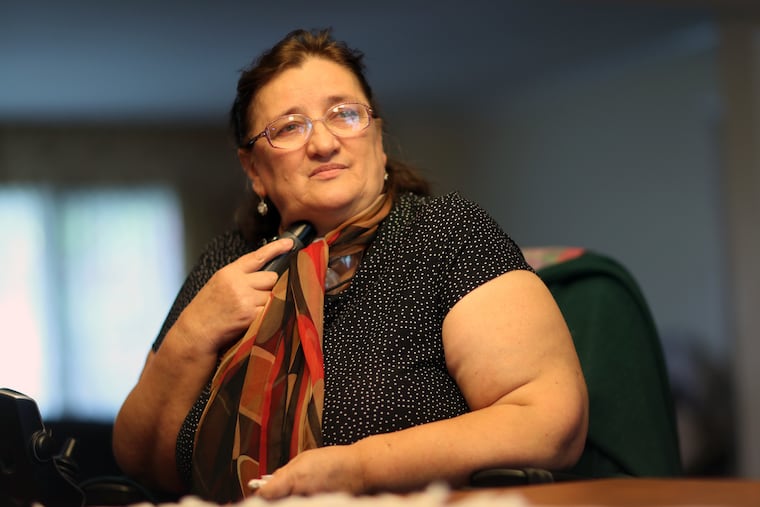Mariya Plekan, 59, survivor of Salvation Army building collapse, dies of COVID-19
In 2018, she told The Inquirer her wish for the rest of her life was simple: “I just want to not end up in the hospital again. I love kids near me, people’s warmth,” Mrs. Plekan said.

- Mariya Plekan
- 59 years old
- Lived in Huntingdon Valley
- She survived being buried alive in the 2013 Salvation Army building collapse
Mariya Plekan survived the unthinkable: being pinned for 13 hours under the rubble of a Center City building in 2013, so thoroughly trapped that she could only gasp for air through a tiny hole and cry out for help.
Mrs. Plekan died of COVID-19 Friday at the Hospital of the University of Pennsylvania. She was 59.
An immigrant from Ukraine, a widow, mother and grandmother, Mrs. Plekan came to Philadelphia to care for relatives. She missed her family terribly but sent them money and clothes, often purchased at the Salvation Army thrift store at 22nd and Market.
She was shopping in the one-story store on June 5, 2013, when demolition workers tearing down an adjacent building caused the collapse, one of the worst disasters in Philadelphia history. Seven people died; 13 were injured, but none so seriously as Mrs. Plekan, who was the last to be pulled from the rubble.
Doctors dubbed her the “Miracle on Market Street.” No one was quite sure how she managed to survive being buried alive for so long.
» READ MORE: ‘I’m not angry,’ says Mariya Plekan, 5 years after losing legs in Salvation Army building collapse
The collapse altered Mrs. Plekan’s life forever. Both her legs had to be amputated above the hips. She underwent 30 surgeries, had kidney and lung problems, and lost the ability to speak. She required round-the-clock medical care. She spent years in hospitals and nursing homes.
Mrs. Plekan won a $95.6 million settlement in 2017.
Though her medical issues made life difficult in some ways, she relished it in other ways. Her children moved to the U.S.; she loved having them and her two grandchildren close.
In 2018, she told The Inquirer her wish for the rest of her life was simple: “I just want to not end up in the hospital again. I love kids near me, people’s warmth,” Mrs. Plekan said.
She said she was not angry, despite the calamities that had befallen her. After a 17-week trial, a Philadelphia Common Pleas Court jury found five corporate and individual defendants liable for the deaths and injuries caused by the collapse.
Andrew J. Stern, a lawyer who represented Mrs. Plekan, said in many ways she represented the spirit of her adopted city: feisty, with a big heart.
“She loved Philadelphia,” said Stern. “She would visit the museums, she had friends and was active in her church.”
Though she experienced considerable pain, she still found joy, Stern said.
“She was such an inspiration,” he said. “Despite literally having half of her body amputated, she would motor around in her wheelchair and just had the biggest smile on her face.”
Pre-pandemic, Mrs. Plekan enjoyed trips to the mall, church services and activities, and exploring her Huntingdon Valley neighborhood. She was a gracious host, insisting guests enjoy Ukrainian specialties.
She would have turned 60 in March.
Ultimately, though, Mrs. Plekan could not defeat the pandemic that has killed more than 2.3 million people worldwide to date. Mrs. Plekan died with her daughter and son at her side; they hope that now her name can be added to the Center City park that memorializes the other Salvation Army victims.
“It means a lot to her children,” said Stern. “They want her to be remembered. She was one of the victims.”
Mrs. Plekan was born in Lviv, in western Ukraine, and lived for most of her life in Ivano-Frankivsk. She worked as a cook and raised two children before moving to the U.S. in 2002 to take care of her late husband’s aged aunt and uncle.
She is survived by her daughter Nataliia Holovchak and son Andrii Plekan and her granddaughter and grandson. Her husband, Roman, predeceased her.
Funeral information is not yet complete, but services will be private.